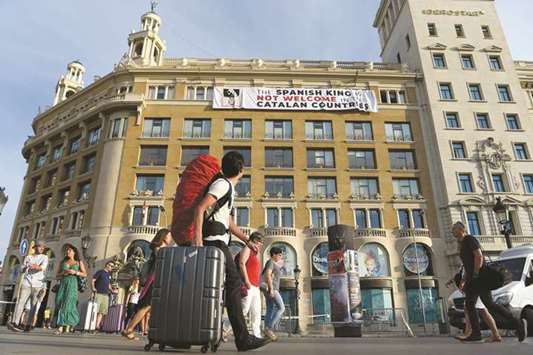Families of the victims had called for a “truce” in the political row over Catalonia’s failed secessionist drive last October, which quickly overshadowed the bloody attacks that shook Spain.
However, right above the spot on Barcelona’s famous Las Ramblas boulevard where a van came to a stop after ploughing into and killing 14 pedestrians on August 17, 2017, separatist activists unravelled a banner reading: “Free political prisoners. Without them this ceremony is a scam.”
Under the banner – which refers to separatist leaders in jail over the failed secession attempt – relatives of the victims laid flowers on a pavement mosaic designed by Barcelona-born artist Joan Miro.
Further up the road on the central Plaza Catalunya, another large banner hung from a building reading in English: “The Spanish king is not welcome in the Catalan countries”, with an upside-down picture of the monarch, who took a hardline stance against the secession bid.
King Felipe VI, his wife Queen Letizia and Prime Minister Pedro Sanchez joined families of the victims on the plaza for an emotional commemoration, to cries of “long live the king” and “long live Spain” by pro-unity onlookers sporting Spanish flags.
“It was a complete disgrace, such a shame. In the end others took the limelight and not the victims,” Jose Vargas, president of the Catalan association of terror victims told AFP.
A year ago, tourists and locals in Barcelona were enjoying yet another sunny day in the city, perusing the many flower stands that line Las Ramblas.
Around 4.30pm (1430 GMT), everything changed.
Younes Abouyaaqoub, a 22-year-old Moroccan man, drove his van into the crowds, killing 14 people, including two children aged three and seven.
“I was really lucky as I had left half an hour before but my mother was still there and she’s been really affected,” said Fidel Poles, a 33-year-old florist. “The man from the flower shop opposite as well – he saw a woman dying in front of him and he’s having a really hard time.”
Abouyaaqoub fled, stabbing to death a young man before stealing his car.
Hours later, a car carrying five of his accomplices sped into the seaside resort of Cambrils some 120km (75 miles) south of Barcelona.
The five occupants of the Audi A3 jumped out and went on a stabbing spree, killing a woman, before they were shot dead by police.
Even then, at a defiant gathering against the attacks days after they happened, the king was jeered by supporters of independence.
Yesterday, separatist organisations staged their own commemorative marches to avoid being in the monarch’s presence.
On Twitter, Sanchez stressed the need for “the unity of all of Spanish society”, which “makes us stronger in the face of terror and barbarism”.
Catalonia’s pro-independence president Quim Torra said “we emerged stronger and more united and more convinced of our principles” after the attacks.
He paid tribute to former Catalan police chief Josep Lluis Trapero and Joaquim Forn, the former regional interior minister who is in jail over the subsequent secession bid, and whom Torra described as “unjustly imprisoned”.
Ruben Guinazu, one of the victims in Cambrils, described the horror of a moment when he was convinced he would die.
“I don’t remember anything about the attacker, I only saw him stabbing me. He left the knife stuck in my face, it plunged 15cm (6”) into my head,” the 55-year-old said. “He slashed my tonsils, my carotid, my vocal cords, my tongue.”
The Islamic State group claimed responsibility for the carnage but investigators have not found any evidence that the cell of young men who carried them out had any international links.
They believe an imam in the Catalan mountain town of Ripoll indoctrinated a group of youths of Moroccan origin.
They made explosives at an abandoned house which police believe they intended to use to strike the Sagrada Familia basilica in Barcelona, the city’s Camp Nou stadium or even the Eiffel Tower in Paris.
However, these accidently went off on August 16, destroying the house, killing two of them including the imam, and prompting the remainder of the cell to improvise a vehicle attack similar to the ones carried out in other cities such as Nice and London.

